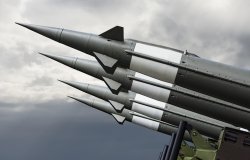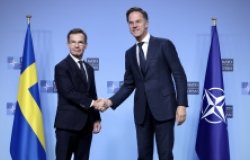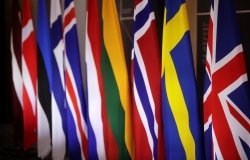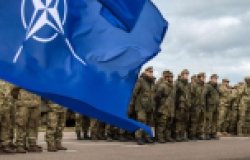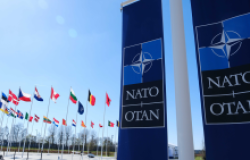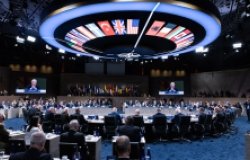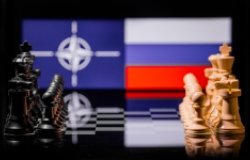NATO, EU Integration Efforts Deserve Greater U.S. Support, Wilson Center Scholar Advises
European Studies Senior Associate Nida Gelazis briefed Congress’ Helsinki Commission before the upcoming NATO summit, to be held in Chicago this spring. Gelazis’ testimony was part of a hearing that examined NATO’s role in preventing conflict in the Western Balkans, among other important Euro-Atlantic issues.
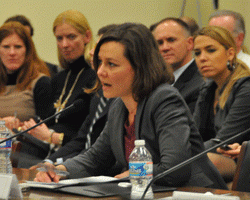
The Commission on Security and Cooperation in Europe (U.S. Helsinki Commission) Hearing:
“The Western Balkans and the 2012 NATO Summit”
Remarks by Nida Gelazis, Senior Associate of the European Program, Woodrow Wilson International Center for Scholars
Chairman and Members of the Helsinki Commission: Thank you for this opportunity to testify on NATO and the Western Balkans. I will base my testimony on some of the conclusions from working group meetings organized at the Wilson Center, which aimed at finding common ground on European and American perspectives on the region’s Euro-Atlantic integration.
These discussions were based on three premises: first – that peace and stability in the Western Balkans can only be achieved by shifting domestic politics away from ethno-nationalist ambitions and toward building open and democratic institutions that serve the interests of all citizens and will allow a country to actively participate in European institutions. Second, the process of becoming a member of the European Union and NATO is itself transformative, and that transformation can end abruptly once a country achieves membership. Third, given the region’s legacy of conflict, it will be more difficult for the Western Balkans to meet the accession criteria to NATO and the EU than it was during previous enlargements.
Working from these premises, it is important to recognize that the European Union’s enlargement process has a much stronger transformative power than NATO enlargement. NATO’s norms focus squarely on military issues, which are relatively easier to implement given the natural hierarchy within defense institutions. Therefore, even though NATO requires that all candidates are democratic, it relies on outside standards and actors to measure and evaluate democratic consolidation. As in previous enlargements, ensuring that state institutions are effective and democratic is driven by the EU. Therefore, NATO enlargement is not a replacement for EU enlargement. It is essential, rather, that the United States continue to actively support not only NATO, but also EU enlargement, and help the countries of the Western Balkans achieve the goal of Euro-Atlantic integration.
This distinction between the transformative impact of the EU and NATO is made clear by the difference between the two countries that became NATO members in 2009: Croatia and Albania. Both countries met the criteria for NATO accession and today they have active troops participating in the International Security Assistance Force in Afghanistan (currently, there are 286 troops from Albania and 317 troops from Croatia, http://www.isaf.nato.int/troop-numbers-and-contributions/index.php). But where the Croatian government continued to adopt political and economic reforms that were necessary for EU accession, Albania’s progress has been stalled by a political impasse, allegations of government corruption and election irregularities. The transformation in the former meant that Croatia was invited to join the EU last year, while the Council postponed offering Albania candidate status. It is important to keep this limited capacity in mind as we move forward: NATO membership may soon be granted to several countries that have met or are working to meet the criteria, but we should be aware that those reforms are limited, compared to the transformation that the EU requires. Moreover, once countries become members, the opportunity to resolve internal or external problems diminishes substantially.
Indeed, NATO and the EU have run into the same problems in many countries in the region, and since NATO has fewer tools at its disposal, the EU is seen as a leader in transforming the region, especially when it comes to bilateral issues. The events of the last few months highlight the problems facing the international community:
In Kosovo, NATO returned to its former role as the first responder after barricades were erected in the North. Although NATO had planned to further reduce its troops in Kosovo by the end of 2011, this reduction was postponed due to the violence that broke out. The violent reaction to protests by Kosovar police that took place last weekend does not inspire confidence that local police will be able to take over from NATO any time soon. Meanwhile, the EU led negotiations between Pristina and Belgrade have been slow but relatively fruitful, especially since it has the power to bring Serbia to the table with the carrot of Candidate status.
In Bosnia and Herzegovina, it took 14 months to form a government, which stalled the progress toward meeting the final requirement for activating the Membership Action Plan. During this period, NATO officers could do little aside from conducting an audit of defense property. It remains to be seen how long it will take for the Entities to muster the political will to transfer state and defense property to the government. Even if this is done relatively quickly, the country’s constitution as well as the continued presence of the Office of the High Representative challenge its democratic credentials. NATO enlargement therefore, cannot replace EU enlargement, but both must be elements of a larger, coordinated policy between American and European partners.
Another observation of the Working Group meetings is that because integration into European institutions is an elite-driven process, it is left to politicians in the region to explain the accession process to their constituents. In some cases, politicians have created narratives in which conditionality is seen as blackmail or that meeting conditions undermines national interests.
This is most notably the case in Macedonia, where Greece is blamed for the lack of progress in both EU and NATO accession. The fact that the International Court of Justice recently ruled in Macedonia’s favor would seem to be further evidence to support that claim. However, the European Commission’s recent progress report identifies a series of worrisome political trends in the country, which require us to question whether the country is moving in the direction of building a consolidated democracy.
Albania’s admission to NATO might serve as an example here – if the United States wants to see effective, democratic institutions and an effective cooperation between ethnic groups in Macedonia, there may be good reason to wait for an agreement with Greece, since an agreement would offer evidence that Macedonia’s leaders have put their undemocratic ethno-nationalist aims behind them. At the same time, the United States ought to put more pressure on Greece to participate in finding a workable solution.
In Serbia, the process of European integration is broadly seen as trading national interests for economic development. The public is understandably even less sympathetic toward NATO. It is therefore important for the United States and its partners to engage with civil society organizations in Serbia and throughout the region, as a way to offer a different narrative about the NATO and EU accession processes, and in order to support local NGOs that are making demands on their governments which are in line with EU and NATO conditions. Direct communication with civil society will help to maintain support for reforms, even with a protracted accession process.
Direct engagement with the public will also diminish another problem that was identified by the Working Group: that the primacy of the EU and NATO accession policy is seen as evidence that America is pulling out from the region. The U.S., therefore, should be more visible in public debates about Euro-Atlantic integration: we ought to show that EU and NATO integration are linked and that we are putting our weight behind this process.
Our involvement with civil society should aim at increasing the authenticity of international conditions, showing that the conditions are legitimate and necessary and that they do not compete with national interests. With the cooperation of our partners in Europe, we can work on developing policies similar to the successful visa liberalization strategy, which combined conditions with clear and immediate rewards. We might consider what more could be done through the Adriatic Charter or the National Guard’s State Partnership Program to create additional engagement between the United States and the countries of the region. Adding additional programs will reinforce the message that the transformative process of integration is the prize, not just membership.
Related Program

Global Europe Program
The Global Europe Program is focused on Europe’s capabilities, and how it engages on critical global issues. We investigate European approaches to critical global issues. We examine Europe’s relations with Russia and Eurasia, China and the Indo-Pacific, the Middle East and Africa. Our initiatives include “Ukraine in Europe” – an examination of what it will take to make Ukraine’s European future a reality. But we also examine the role of NATO, the European Union and the OSCE, Europe’s energy security, transatlantic trade disputes, and challenges to democracy. The Global Europe Program’s staff, scholars-in-residence, and Global Fellows participate in seminars, policy study groups, and international conferences to provide analytical recommendations to policy makers and the media. Read more

